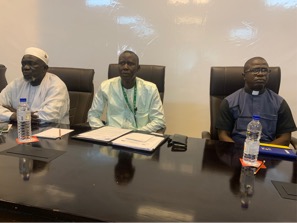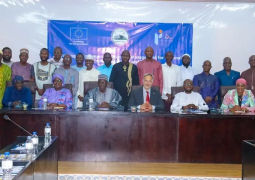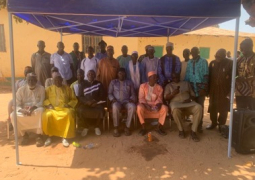
The event, held at Bakadaji Hotel was also designed to highlight the crucial role of faith-based organisations in promoting environmental stewardship and sustainability practices.
Also, the primary objective of this national dialogue was to establish a committed stance in communicating environmental issues through reportage, sensitisation and awareness campaigns.
Welcoming the gathering, Dawda Badjie, Director General of the NEA, reminded that earth is the only planet among the nine in ‘our galaxy’ where life can exist.
Moreover, he informed that it has been subjected to numerous forms of environmental degradation, making life increasingly unbearable and challenging. He reiterated the belief that environmental protection is everyone's responsibility.
DG Badjie expressed gratitude to religious leaders for their attendance and support, urging them to disseminate the information shared during the meeting to their various congregations.
Alhaji Omar Mbowe, a representative of the Supreme Islamic Council, emphasised the critical importance of three fundamental pillars in Islam namely soil, water and air, that must be respected and preserved.
Those natural resources, he added, are essential for our lives and well-being, and failing to safeguard them could result in dire consequences for humanity.
Alhaji Mbowe reminded that the preservation of soil, water, and air is not only a religious obligation, but also a practical necessity.
He revealed that these elements are vital for sustaining life on Earth, as they play a crucial role in agriculture, health, and the overall balance of our ecosystem.
The degradation of these resources, he warned, could lead to severe environmental crises, including food and water shortages, health hazards, and ecological imbalances.
Moreover, Mbowe acknowledged the reality of climate change, pointing out that the effects of environmental neglect are already manifesting globally.
He to that end, he called for collective action and responsible stewardship towards environmental management.
“By respecting and protecting soil, water, and air, we not only fulfill our religious duties but also contribute to the global effort to combat climate change and ensure a healthier, more sustainable future for generations to come.”
Also speaking, Father Moses Drammeh, representing the Christian Council, passionately called for the protection of the environment for the sake of future generations.
He emphasised that it is a divine mandate to safeguard God's creation, and warned that humanity will be held accountable by God ‘if we fail’ to take proper care of the environment.
Father Drammeh elaborated on the theological basis for environmental care, highlighting that the Bible teaches the importance of respecting and nurturing the Earth.
He disclosed that humans are entrusted by God to be stewards of creation, tasked with the responsibility for maintaining its health and vitality. That duty, he noted, is not just for the present but also for ensuring that future generations inherit a world that is vibrant and life-sustaining.
He urged individuals and communities to renew their commitment to environmental stewardship, while calling for practical actions such as reducing waste, conserving water, planting trees, and supporting policies that protect the environment.
By taking those steps, he argued, people can demonstrate their respect for creation and fulfill their God-given responsibility.
Read Other Articles In National News

International IDEA trains NAMs & staff on inclusion, diversity mgmt
Jul 17, 2025, 11:35 AM




